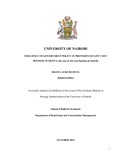| dc.description.abstract | Housing is a right as enshrined in the Kenya Constitution, and provides for adequate, decent and affordable housing for all. Adequacy in that, there are good quality rental and owner occupier housing units for low income families. Affordable in that total housing costs are affordable to those that have low income. Decent in that it provides a foundation for good physical and mental health, personal development and fulfillment of life objectives. Affordable housing is however a major problem in Kenya. Informal settlements and slums have continued to grow and a large percentage of the urban population lives here. The slums are characterized by congested tin roofed and mud houses. There is also poor infrastructure with regards to sewerage system, electricity, clean water and access roads.
According to the National housing policy the estimated current housing needs are at
150,000 per year while the current production of new housing in urban areas is only
20,000-30,000 units annually giving a shortfall of over 120,000 units per annum. This shortfall in housing has been met through proliferation of squatter and informal settlements and overcrowding.
Kenya, like many other developing countries often come up with housing policies, plans and institutional frameworks geared towards provision of housing low income groups to alleviate the situation mentioned above.
This seeks to analyze the various legislative and institutional frameworks set by the government with special emphasis to low cost housing. The research questions include finding out the impact of the housing policies and institutional frameworks. A review of existing literature in the area of the study has also been done. Chapter three shows the design and methodology of the research. The following chapter provides an in-depth analysis of the response of both the policy makers and developers of the low cost housing on housing policies. In the findings it emerged that a lot needs to be done to improve on the legislative and institutional frameworks in the housing sector. As a result the study
had its main recommendation as the review of outdated legislation in the housing sector such as the Building Code. | en |

